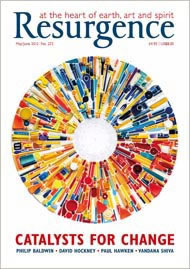How can one resist a book whose title winks at Charles Darwin while promising insights into beauty?
It is a book written by a passionate lover of Nature’s beauty, and starts with a moving, heartfelt meditation on Lake Pedder in Tasmania, where the author was born and grew up. It is a lake whose once-undisturbed beauty was lost forever by the building of a dam, whose beauty was not part of the decision-maker’s calculus of human needs. Throughout the book, one feels John Griffin’s deep personal connection with Nature, and the lost world of spirit – lost because of the half-sightedness of reason, measurement and science.
Griffin argues skilfully for a re-understanding of beauty, and insists that we must not lose sight of the fact that the beauty of Nature is really real. It is not something subjective, or a mere psychological event. Nor is it some emergent property of consciousness. It is a truth, an absolute reality, which exists at all levels of Nature – in a mountain meadow at sunrise, in a single wild flower, in birdsong. Beauty, he claims, is, in fact, Nature’s essence.
He tells us that it is Nature that causes beauty to become known or perceived by us – that, “by virtue of its harbouring the qualities within ourselves that are potentially ours, nature must possess a means of ‘producing’ the qualities within ourselves that are our own true nature,” and “to seek beauty in nature would be to seek, and move towards, the essence of nature, and the consciousness of the Divine.”
Griffin vigorously questions the legitimacy of the dominant scientific, materialistic and reductionist worldview that is premised and anchored in measurement. He finds his intuition “justifiably outraged by the diminished and seemingly back to front world this premise implies”, and asks us to come together to “seek the ruin of such a system”. And do this before it ruins us!
He argues that when “mind or reason” becomes the prevailing, even exclusive, mediator of perception, we lose the ability to perceive beauty, and this he suggests is what has substantially happened. To save beauty, we need to reinstate a mode of consciousness, or perceptive faculty, that is “adequate to the task of perceiving all that beauty is”. And this must come from a revival of the understanding in traditional wisdom.
I wonder if dichotomous debates – science vs spirituality, or senses vs spirit – muddy the nature of the beauty experience. Isn’t beauty perceived and experienced in a variety of ways, at different levels, and in varying intensities? Isn’t reason also a window into the perception and experience of beauty? Haven’t scientists, particularly mathematicians, perceived beauty through their methods imbued with reason and measurements? Evidence suggests that many have.
One way out is to consider the mind as another sense, as was the case in traditional Indian philosophy. This neatly pulls the rug from under the either/or debate about perception – whether it occurs via the physical senses or just the mind. Here, all six senses engage in the dance of perception-cognition-consciousness. Somehow this does make good sense, as it recognises that perceptions form in an interplay between the realities of what is out there, and what is, so to speak, in here.
Reconciliation between objectivists and subjectivists is possible and would help. Let’s agree that beauty is both objective and subjective – a perceptual experience of what is in Nature or in art (sacred, temporal, ornamental, utilitarian), as well as a state of being, in Nature, and in other human-made forms – buildings, products, and so on. I have argued that beauty might be ‘wellbeing’ in Nature and in humans – at physical, mental and spiritual levels. That is why beauty signals wellness, and occurs in the excellence of relationality in Nature, and indeed in all systems and things.
I found the explanations in this book of the two-way relationship between the qualities of Nature and human consciousness compelling: “Immediate awareness (unmediated by rational or discursive thought) of the natural world allows the actual nature of that world – its beauty, for instance – to impinge upon consciousness… Significantly, the process will be self-reinforcing: the presence of beauty in consciousness allows an increasing perception of beauty, while the world’s beauty lends to consciousness a further capacity to experience it.”
On the Origin of Beauty is a hope, an urging, even a demand, that there be a resetting of the course Western civilisation (read ‘global civilisation’) has been on for 400 years, through an ecophilosophy that pulses with beauty, “Nature’s and humanity’s essence”. The author says: “The perception of beauty is like a secret revealed – it is both evidence for an essential reality and for the unfolding of consciousness. When the beauty that dwells at the heart of nature is seen to be the same beauty in our inmost heart, beauty is revealed as a winged messenger.”
Ignoring beauty has been the reason for many of our ecological and other problems, and I wholeheartedly endorse the view that beauty may well be the way out of them.
This is an evocatively written book that includes, as a beautiful bonus, a wise foreword by Satish Kumar.






